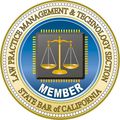 Have I ever gotten a LegalTech summary posted quickly? I don't think so. It seems like every year, the conference falls on a busy week for me. No exception this year; in fact, regretfully, I was only able to stay for the first day.
Have I ever gotten a LegalTech summary posted quickly? I don't think so. It seems like every year, the conference falls on a busy week for me. No exception this year; in fact, regretfully, I was only able to stay for the first day.
As always, I want to inform you that I attended as a guest of the provider, ALM. However, nobody at ALM ever attempts to influence what I write about the conference and as you know by now (hopefully), I write what I see. So, without further delay, here goes…
Usually, I find that the day starts out strong and ends more weakly. You get tired drinking in all of that info, especially now that the format has changed slightly to less sessions of 90 minutes each. This year, the converse was true. The day seemed to start out a bit quite, but by the end of the day, there was a very noticeable pick-up in both energy and attendance.
Scheduling is still the biggest problem; the more events you attend, the more people you know, which is both a positive and a negative:
Positive: You have a lot more to do and will end up attending more events.
Negative: You stop every ten feet to chat with all of the people you know and end up arriving late to every session.
I started with the keynote, presented by Kevin Genirs, Global General Counsel, Investment Banking, Barclays & Former General Counsel, Investment Banking, Lehman Brothers. The topic was, "2008 vs. 2012: Lessons from Lehman Brothers". From an informational standpoint, it was excellent. An insider's view of the Lehman Brothers implosion – how can that not be fascinating? However, it really didn't have anything to do with "Legal-Tech", so to speak. To me, that didn't matter, as listening to the information from someone who was on the front lines served to humanize the event. It's not the same as reading the cold facts in a newspaper or online, or watching them on TV.
As far as session choices, due to having been swamped prior to arriving at the conference, I literally made my choices on the fly. This became amusing when I attended interesting sessions, only to discover that friends and colleagues were presenting them.
Session one was, "Guarding Against the Enemy Within", which pointed out that you're more likely to experience a security breach from within an organization than from without. It's funny, because I'm presenting a very similar talk on Friday, June 22nd at the Calbar Solo & Small Firm Summit. They think the way I do; that people, deliberately or accidentally, are more likely to facilitate a breach than via an outside attack. The session was high on substantive content and I got a lot out of it.
After the lunch break, I attended, "Dealing with Data Theft". I don't think I need to elaborate on the subject matter. As I mentioned, I was pleased to find that a colleague, Wayne Lee from Verizon, was one of the presenters. Again, a very substantive presentation by this panel. Along with the presentation, we were also given a copy of Verizon's 2012 Security report. If you're not familiar with it, you should be.
To finish out the day, I switched tracks and attended, "Exploring Hot E-Discovery Trends: FRCP Amendments, Social Media, and Emerging Case Law". Again, I was pleased to discover that my colleague, Ron S. Best, was one of the presenters. I didn't get as much out of the session because, unfortunately, it was geared to a beginner-to-intermediate audience. That's by no means a bad thing, based on the participation of the attendees – the room was bursting at the seams. What's gratifying is that each year, the increase in awareness and interest in these fields is palpable.
My biggest regret was that I couldn't stay for day two, but we do what we can, right? See you there next year!









